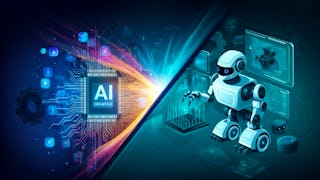- Browse
- Workforce Development
Workforce Development Courses Online
Learn workforce development strategies for enhancing skills and employability. Understand training programs, career development, and labor market trends.
Explore the Workforce Development Course Catalog
 Status: Free TrialFree Trial
Status: Free TrialFree TrialSkills you'll gain: Active Listening, Problem Solving, Collaboration, Presentations, Critical Thinking and Problem Solving, Interpersonal Communications, Teamwork, Conflict Management, Creative Problem-Solving, Constructive Feedback, Creative Thinking, Root Cause Analysis, Team Building, Virtual Teams, Social Skills, Public Speaking, Persuasive Communication, Client Services, Professional Development, Accountability
4.7·Rating, 4.7 out of 5 stars5.3K reviewsBeginner · Specialization · 1 - 3 Months
 Status: NewNewStatus: Free TrialFree Trial
Status: NewNewStatus: Free TrialFree TrialSkills you'll gain: Active Listening, Emotional Intelligence, Interviewing Skills, Executive Presence, Leadership Development, Conflict Management, Social Skills, Business Ethics, Case Studies, Empathy, Team Management, Team Leadership, Relationship Management, Ethical Standards And Conduct, Leadership, Self-Awareness, Workforce Planning, Professional Networking, Business Communication, Communication
4.7·Rating, 4.7 out of 5 stars1K reviewsBeginner · Specialization · 1 - 3 Months
 Status: Free TrialFree Trial
Status: Free TrialFree TrialSkills you'll gain: Training and Development, Training Programs, Employee Training, Developing Training Materials, Adult Education, Train The Trainer, Drive Engagement, Employee Engagement, Compliance Training, Instructional Design, On-The-Job Training, Needs Assessment, Program Evaluation, Professional Development, Learning Styles
4.8·Rating, 4.8 out of 5 stars791 reviewsBeginner · Course · 1 - 4 Weeks
 Status: NewNewStatus: PreviewPreviewT
Status: NewNewStatus: PreviewPreviewTTechnical University of Munich (TUM)
Skills you'll gain: Workforce Management, Production Process, Digital Transformation, Automation, Social Sciences, Organizational Structure, Socioeconomics, Organizational Change, Trend Analysis, Technology Strategies, World History, Emerging Technologies, Sociology, Innovation, Storytelling, Demography, Economics
Intermediate · Course · 1 - 3 Months
 Status: Free TrialFree TrialG
Status: Free TrialFree TrialGGoodwill Industries International
Skills you'll gain: Constructive Feedback, Interviewing Skills, Communication, Coaching, Accountability, Client Services, Virtual Teams, Professional Development, Diversity and Inclusion, Client Support, Workforce Development, Recruitment, Ethical Standards And Conduct, Active Listening, Telecommuting, Needs Assessment, Employee Onboarding, Empathy, Human Centered Design, Gap Analysis
Build toward a degree
4.7·Rating, 4.7 out of 5 stars435 reviewsBeginner · Professional Certificate · 3 - 6 Months
 Status: NewNewStatus: Free TrialFree Trial
Status: NewNewStatus: Free TrialFree TrialSkills you'll gain: Human Resources, Generative AI, Workforce Development, Data Ethics, Recruitment, Workflow Management, Employee Retention, Generative AI Agents, Gap Analysis, Employee Onboarding, People Analytics, People Management, AI Personalization, Talent Management, Automation, Talent Acquisition, Prompt Engineering, No-Code Development, Agentic systems, Business Operations
Beginner · Specialization · 1 - 3 Months
What brings you to Coursera today?
 Status: NewNewStatus: Free TrialFree Trial
Status: NewNewStatus: Free TrialFree TrialSkills you'll gain: Performance Management
4.7·Rating, 4.7 out of 5 stars19 reviewsBeginner · Course · 1 - 4 Weeks
 Status: Free TrialFree Trial
Status: Free TrialFree TrialSkills you'll gain: Prompt Engineering, Prompt Patterns, Generative AI, Responsible AI, HR Tech, ChatGPT, Human Resources Management and Planning, Human Resources, Workforce Planning, Human Resource Strategy, Data Ethics, LLM Application, Artificial Intelligence, Artificial Intelligence and Machine Learning (AI/ML), Data-Driven Decision-Making, Image Quality, Employee Engagement, Recruitment, Machine Learning, Performance Appraisal
4.7·Rating, 4.7 out of 5 stars10K reviewsIntermediate · Specialization · 1 - 3 Months
 Status: NewNew
Status: NewNewSkills you'll gain: Workday (Software), Payroll Processing, Payroll, Payroll Systems, Benefits Administration, Payroll Administration, Human Resources Software, Human Capital, Workforce Management, Staff Management, Business Process, Business Reporting, Data Maintenance, Compensation and Benefits, Dashboard
Beginner · Course · 1 - 4 Weeks
 Status: Free TrialFree TrialU
Status: Free TrialFree TrialUUniversity of Michigan
Skills you'll gain: Talent Management, Talent Pipelining, People Development, Employee Onboarding, Employee Coaching, Talent Recruitment, Performance Review, Talent Acquisition, Performance Management, Leadership Development, Recruitment Strategies, Coaching, Performance Measurement, Recruitment, Employee Engagement
Build toward a degree
4.6·Rating, 4.6 out of 5 stars2.6K reviewsBeginner · Course · 1 - 4 Weeks
 Status: Free TrialFree TrialU
Status: Free TrialFree TrialUUniversity of California, Davis
Skills you'll gain: Fundraising, Grant Writing, Proposal Writing, Prospecting and Qualification, Philanthropy, Campaign Management, Tax Planning, Direct Marketing, Business Writing, Customer Relationship Building, Marketing Strategies, Relationship Building, Estate Planning, Benefits Administration, Administration, Target Audience, Email Marketing, Telemarketing, Stakeholder Management, Negotiation
4.6·Rating, 4.6 out of 5 stars389 reviewsBeginner · Specialization · 3 - 6 Months
 Status: PreviewPreview
Status: PreviewPreviewSkills you'll gain: Workday (Software), People Analytics, Human Resources Software, HR Tech, Learning Management Systems, Human Capital, Human Resources Information System (HRIS), Training Programs, Applicant Tracking Systems, Business Reporting, Full Cycle Recruitment, Business Process, Talent Recruitment
4.7·Rating, 4.7 out of 5 stars110 reviewsBeginner · Course · 1 - 3 Months
Workforce Development learners also search
In summary, here are 10 of our most popular workforce development courses
- People & Soft Skills: Essential for Professional Success: IBM
- Career Readiness & Leadership Skills in the Modern Workplace: Coursera
- Learning and Development: HRCI
- WiTF! - Working in the Future: Technical University of Munich (TUM)
- Goodwill® Career Coach and Navigator: Goodwill Industries International
- Generative AI for Automating HR Workflows: Edureka
- Support Individual Growth and Development: Google
- Generative AI for Human Resources (HR) Professionals: IBM
- Workday Payroll for Business Users: Workday
- Managing Talent: University of Michigan
Frequently Asked Questions about Workforce Development
Workforce development refers to the process of enhancing a person's skills, knowledge, and abilities to meet the demands and requirements of the job market. It aims to equip individuals with the necessary skills and competencies to excel in their chosen careers. This can include gaining new skills through training programs, acquiring certifications, attending workshops or seminars, and accessing educational resources. Workforce development is crucial in helping individuals adapt to changing job market trends and technological advancements, thus increasing their employability and career opportunities.
There are various skills that are valuable for workforce development. Some key skills to consider include:
Communication Skills: Being able to effectively communicate verbally and in writing is essential in the workplace. This includes skills such as active listening, persuasion, and clear written communication.
Problem-Solving Skills: Employers value individuals who can identify and analyze problems, propose creative solutions, and make effective decisions. Developing critical thinking and analytical skills can greatly enhance your problem-solving abilities.
Adaptability and Flexibility: The ability to adapt to new situations and handle change is crucial in today's fast-paced work environment. This includes being open to new technologies, ideas, and challenges, as well as being resilient in the face of setbacks.
Digital Literacy: As technology continues to advance, having a strong foundation in digital skills is necessary. This includes proficiency in using productivity tools, online collaboration platforms, and data analysis software.
Leadership and Teamwork: Effective teamwork and leadership skills are highly valuable for career growth. These skills involve the ability to work collaboratively with others, motivate and inspire team members, and delegate responsibilities effectively.
- Continuous Learning: In a rapidly evolving job market, being a lifelong learner is essential. This involves staying up-to-date with industry trends, seeking out professional development opportunities, and proactively expanding your skill set.
Remember, the specific skills required for workforce development can vary depending on the industry and job role. Researching and understanding the specific skills in demand within your field of interest can help you tailor your learning journey accordingly.
With Workforce Development skills, you can explore various job opportunities across industries. Some potential career options include:
Workforce Development Specialist: As a specialist, you can assist individuals in developing skills, identifying job opportunities, and providing training programs to meet workforce demands.
Career Counselor: With in-depth knowledge of workforce development, you can guide individuals in assessing their skills, interests, and career goals to help them make informed decisions and find suitable employment.
Training Coordinator: In this role, you can organize and coordinate employee training programs within organizations, ensuring effective skill development and enhancing workforce capabilities.
Adult Education Instructor: With your expertise, you can teach adults in vocational, technical, or specialized training programs to enhance their workforce skills and promote career advancement.
Human Resources Manager: Workforce Development skills can be valuable within HR management, allowing you to design and implement employee development programs, worker retention strategies, and skill gap analysis to build a highly skilled workforce.
Talent Acquisition Specialist: With knowledge of workforce development, you can assist organizations in identifying and recruiting qualified candidates who possess the necessary skills and attributes to meet their workforce needs.
Training and Development Manager: In this role, you can oversee the planning, implementation, and evaluation of training programs across an organization, ensuring employees are equipped with the skills required for their job roles.
Non-profit Program Manager: Utilize your skills to manage and develop workforce development programs within non-profit organizations, helping individuals gain new skills for employment and economic stability.
Adult Literacy and ESL Instructor: Teach adults essential workforce skills like literacy and English as a Second Language (ESL), enabling them to improve their employment prospects and participate effectively in the workforce.
- Entrepreneurship and Small Business Advisor: With your knowledge of workforce development, you can support aspiring entrepreneurs and small business owners, providing guidance in skills development, business planning, and sustainable growth strategies.
Remember, these are just a few examples, and Workforce Development skills can be highly transferable across industries and job roles.
People who are best suited for studying Workforce Development are individuals who are interested in helping others succeed in their careers and are passionate about creating positive change in the workforce. They should have strong communication and interpersonal skills, as well as a desire to understand the needs and challenges of different industries and job markets. Additionally, individuals who are adaptable, resourceful, and enjoy problem-solving will thrive in this field, as Workforce Development often involves finding innovative solutions to bridge the gap between job seekers and employers.
There are several topics you can study that are related to Workforce Development. Here are a few examples:
1) Career Counseling: Studying career counseling can equip you with the skills to help individuals make informed decisions about their career paths and guide them towards meaningful employment.
2) Human Resources Management: This topic focuses on the management of human resources within organizations, including areas such as recruitment, training, performance evaluation, and employee development.
3) Organizational Behavior: Understanding organizational behavior can provide insights into how individuals and groups function within a workplace, including topics like employee motivation, leadership, teamwork, and communication.
4) Training and Development: This involves studying methods and techniques to enhance employee skills, knowledge, and abilities, such as training programs, workshops, and e-learning.
5) Business Communication: Developing effective communication skills is crucial in the workplace. Studying business communication can help you understand how to convey information clearly and professionally, both orally and in writing.
6) Project Management: This topic teaches you how to plan, execute, and manage projects effectively, ensuring that goals are met, resources are utilized efficiently, and teams are coordinated.
7) Entrepreneurship: If you're interested in starting your own business or working in a startup environment, studying entrepreneurship can provide you with the knowledge and skills needed to navigate the challenges of launching and managing a successful venture.
These are just a few examples, and there are many more topics within the field of Workforce Development that you can explore based on your specific interests and career goals.
Online Workforce Development courses offer a convenient and flexible way to enhance your knowledge or learn new Workforce development refers to the process of enhancing a person's skills, knowledge, and abilities to meet the demands and requirements of the job market. It aims to equip individuals with the necessary skills and competencies to excel in their chosen careers. This can include gaining new skills through training programs, acquiring certifications, attending workshops or seminars, and accessing educational resources. Workforce development is crucial in helping individuals adapt to changing job market trends and technological advancements, thus increasing their employability and career opportunities. skills. Choose from a wide range of Workforce Development courses offered by top universities and industry leaders tailored to various skill levels.
When looking to enhance your workforce's skills in Workforce Development, it's crucial to select a course that aligns with their current abilities and learning objectives. Our Skills Dashboard is an invaluable tool for identifying skill gaps and choosing the most appropriate course for effective upskilling. For a comprehensive understanding of how our courses can benefit your employees, explore the enterprise solutions we offer. Discover more about our tailored programs at Coursera for Business here.










